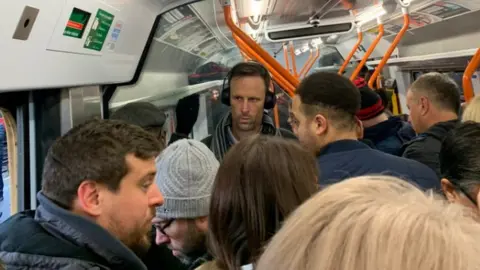South Western Railway offers compensation after strikes
South Western Railway (SWR) is to offer compensation worth up to five days of travel to passengers affected by the 27 days of strikes in December.
The walkout by Rail, Maritime and Transport (RMT) union members over the role of guards on trains resulted in travel chaos over the festive period.
SWR said it would offer the payments in addition to its normal delay repay arrangements due to the "duration and intensity" of the industrial action.
More strikes by RMT are planned.
SWR said the compensation scheme - which is yet to open - would run in two phases, the first for season ticket holders and the second for customers for whom it does not hold contact details.
It said it would notify customers when each phase begins.
The company operates routes between London Waterloo, Reading, Bristol, Exeter, Weymouth and Portsmouth, as well as the Island Line on the Isle of Wight.
The industrial action in December disrupted 600,000 passenger journeys each day.
Alison Bunce, who commutes from Frimley in Surrey to London and said her 24-mile journey was taking her more than two-and-a-half hours, told BBC News: "I'm really surprised they have given anything back.
"I pay over £4,000 a year for a season ticket so I think I'll get back about £50 back. It's a bit of a drop in the ocean... but it's better than nothing.
"For me it's not about about the money - I lost hours, weeks of my life in December which I'll never get back."
 Taler Kelly
Taler KellySWR managing director Mark Hopwood said: "Whilst SWR worked very hard to keep people moving during the strikes, I know that our passengers often still had to cope with delays, cancellations and packed trains and the compensation reflects that.
"This compensation package will provide season ticket holders and daily ticket holders who travelled frequently during the strike with compensation to recognise the disruption they faced."
In response, RMT general secretary Mick Cash said: "SWR has already been heavily compensated by the government during the RMT action over rail safety so this is just the company recycling a bit of public money back to the taxpayers.
"Instead of indulging in this financial chicanery the company should be back round the table with the union negotiating a settlement to the guards' safety dispute."
A spokesperson for SWR labelled any suggestion it was making money from the strikes as "absurd".

Analysis
By Paul Clifton, BBC South transport correspondent
No-one wants a strike on the railway, including South Western Railway.
Yes, it receives some money from the government for events which are considered beyond its control - we don't know exactly how much.
But SWR has always said it doesn't come close to covering the real cost of a month of disruption, during which only half the normal number of services run.
The reputational damage is long-lasting - when trains don't run as scheduled, it puts people off travelling. Not just existing passengers but potential future customers too.
The bottom line is this: SWR lost £137m last year. Whatever you think of SWR, you cannot accuse it of cashing in on the strike.

Transport Secretary Grant Shapps said: "Passengers across SWR's extensive network had their December ruined by reckless and unnecessary strike action.
"They have understandably had enough, so we support SWR taking action to ensure people are compensated for the disruption caused to their lives."
